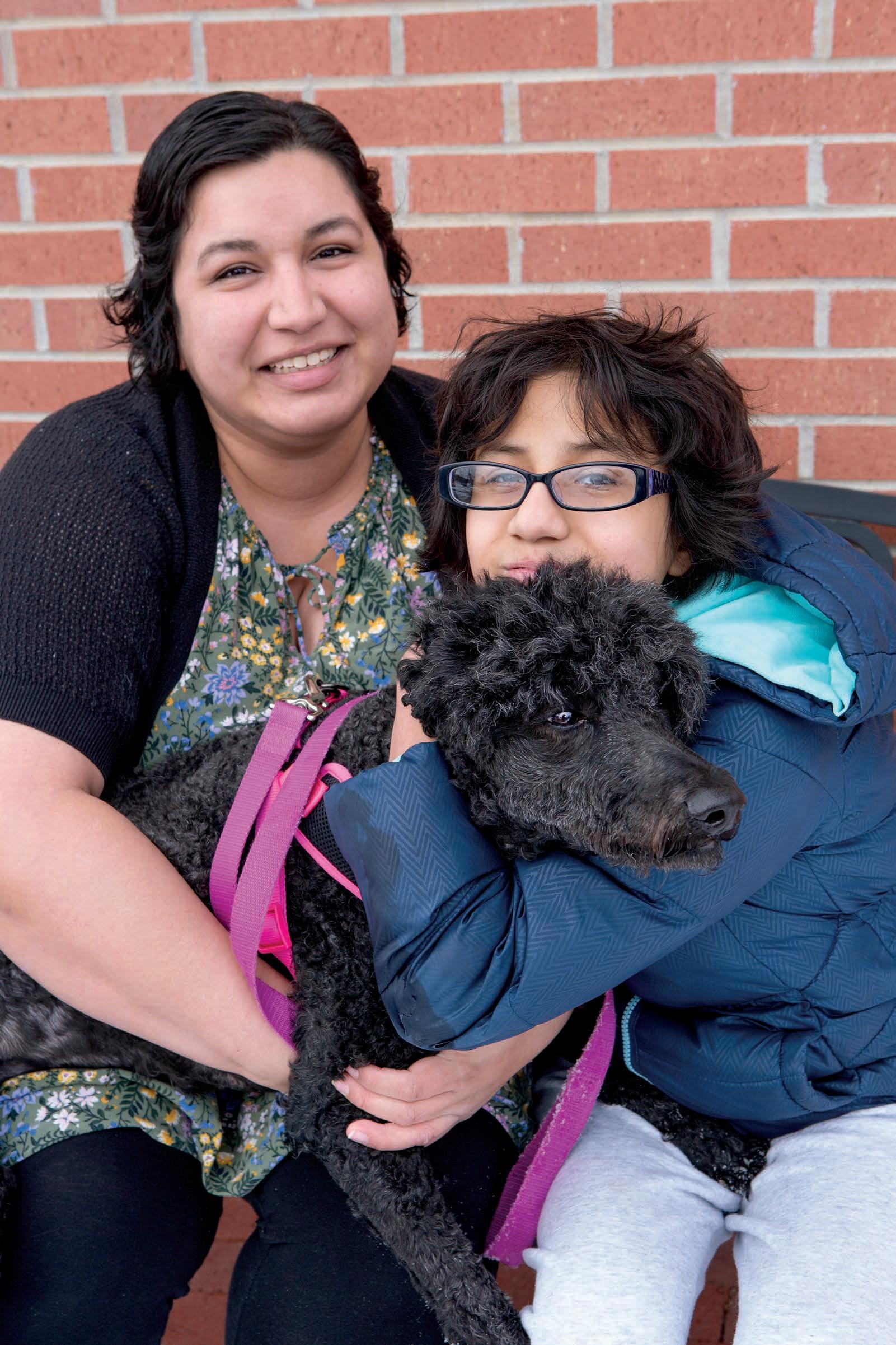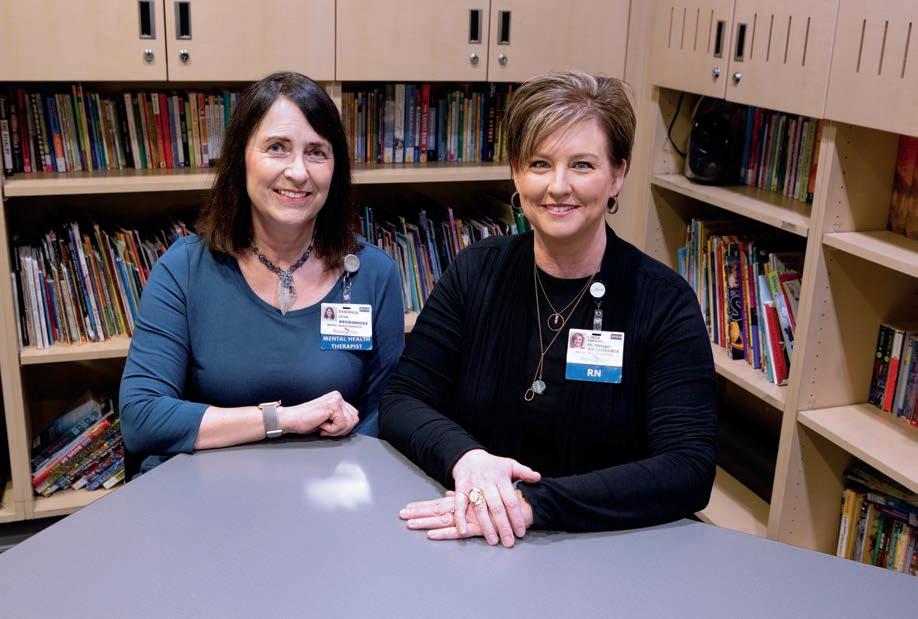
5 minute read
YOUTH MENT AL HEALTH Youth in crisis find treatment options
Daisy Mejia (left) and Abby enjoy everyday activities, like spending time with Molly the poodle. About a year ago, Daisy brought Abby to Bryan’s Mental Health Emergency Department when her daughter was in crisis. Today Abby is healing and says she knows where to find help when she needs it.
Youth in crisis find treatment options
Mental health issues and suicide are on the rise among Nebraska’s young people.
“Suicide is the second-leading cause of death among teens and young adults,” says counseling and program development manager Dave Miers, PhD, LIPC. “We can clearly see that many of our young people are experiencing serious mental health crisis situations. Treating youth in crisis, including those who are suicidal, is therefore an essential part of what we do at Bryan’s Youth Mental Health Services.
“We’ve had a longtime devotion to the mental health of youth and support of their families. In 1986, Bryan began a youth inpatient treatment program and in 1993 created Nebraska’s first Mental Health Emergency Department.”
24-hour emergency services for youth and inpatients
He notes, “Our Mental Health Emergency Department is open 24 hours a day, every day. Each year more than 6,500 patients receive this vital service, including 2,000 youth.”
“We see patients 5 to 18 years old who often come in with feelings of wanting to harm themselves or others,” says Youth Mental Health Services nurse manager Linda Kimminau, MSN, RN. “We’re well-equipped to keep these patients safe and provide treatment specifically for their needs.”
To expand these vital services, Bryan began offering telemedicine mental health emergency services in other Nebraska communities in 2016. Today, Bryan collaborates with hospitals to offer this care in Beatrice, Columbus, Crete, Neligh, Tecumseh, Valentine and Wahoo.
“Our Mental Health Telemedicine service provides expert mental health evaluation quickly to young patients in their own communities,” says Dr. Miers. “Youth and families can stay close to home, near relatives and friends, and avoid a long drive to Bryan’s Mental Health Emergency Department for crisis assessment because telemedicine connects their local hospitals with providers at Bryan.”

Treatment options meet patient needs
Patients needing hospitalization are cared for in Inpatient Youth Mental Health Services by an interdisciplinary team.
“This includes a psychiatrist, social worker/therapist, nurses and a teacher. Inpatient care usually lasts two to four days, stabilizing patients so they can be cared for at home,” Linda says. “Therapy can be continued under Bryan’s Partial Hospitalization Program or our Outpatient Counseling Center to keep providing treatment and support.” Patients who have previously worked
Therapist Sandra Breach and nurse manager Linda Kimminau are part of the team helping youth navigate crisis situations.

with a therapist in the community continue seeing that therapist in follow-up appointments.
Therapy insights become Abby’s strengths
Daisy Mejia of Tecumseh became very concerned about her 11-year-old daughter Abby in the Fall of 2018. “She had persistent crying spells and sadness, and I just couldn’t pull her out of it,” Daisy recalls.
“I was upset and I felt I didn’t belong,” Abby says. “I just wanted to sit in my room, and I didn’t feel any interest in anything.”
Over several months, Abby and Daisy worked with an outpatient counselor. “But in January, 2019,” Daisy says, “Abby hit an all-time low. She was in a very dark place, with thoughts of suicide. Her school counselor suggested Bryan’s Mental Health Emergency Department.
“Abby was hospitalized at Bryan for five days, and once more in April 2019. There, and through outpatient counseling, we found the perfect balance of therapy and medication treatment, and Abby began to make progress.”
Working with Daisy, Abby’s treatment team made a decision that led to an important breakthrough in her healing.
Abby’s counselor, mental health therapist Sandra Breach,
LICSW, of the Bryan Outpatient Counseling Center, says, “Daisy and I felt it would be helpful for Abby to have detailed mental health testing, which showed severe emotional stress earlier in her life that we hadn’t known about.”
That stress, in turn, was what was causing Abby’s depression, anxiety and suicidal feelings.
“We used this new insight in her therapy,” Sandra says. “Working with her mother and me, Abby used her creativity and imagination to solve problems causing her stress, and began to move forward. For example, we identified what triggered her stress at school, and she developed better ways of managing these

problems, like talking over disagreements rather than just feeling upset.”
“When your child is facing mental illness,” Daisy adds, “it’s important to let them know they’re not fighting that battle alone. Parents have to show your child you care, that they’re worth it, and fight for them.”

Be the best of who you are
Abby says she’s learned a lot while working with her therapist. “I understand now that we’re all doing the best we can,” she says. “I also know there will always be people out there who will bring you down, but you don’t have to listen to them.
“You are the best sum of who you are, and when times are hard there are people out there who can help you feel better.” n
Bryan offers free confidential online screenings to all ages. Learn more about youth in crisis at bryanhealth.org/youthmental-health. To support the ongoing work of Bryan Mental Health Services, call 402-481-8605.
Dave Miers, PhD, LIPC, stands next to one of the suicide prevention signs he helped design with assistance from the Bryan Advancement Department and the Bryan Safety Committee.
Bryan placed more than 60 “You’re Not Alone” signs throughout its parking garages and in the Bryan College of Health Sciences.
The Lincoln Lancaster Suicide Prevention Coalition was formed to address suicide prevention. Dr. Dave Miers, who’s a member of the coalition’s leadership group, says one of its goals is to place similar signage in Lincoln’s public parking garages. Bryan and the local coalition collaborated to use grant funding to make 200 signs for city and University of Nebraska garages.
The signage has been effective in saving lives and connecting individuals to resources. Dr. Miers says the coalition heard about individuals and bystanders who reached out for help or connected others to help as a result of these signs.
If you have a concern, don’t hesitate to ask, “Are you suicidal?” and call the National Suicide Prevention Lifeline at 1-800-273-8255. The Mental Health Emergency Room at Bryan West Campus is available 24/7 for mental health emergencies. n










